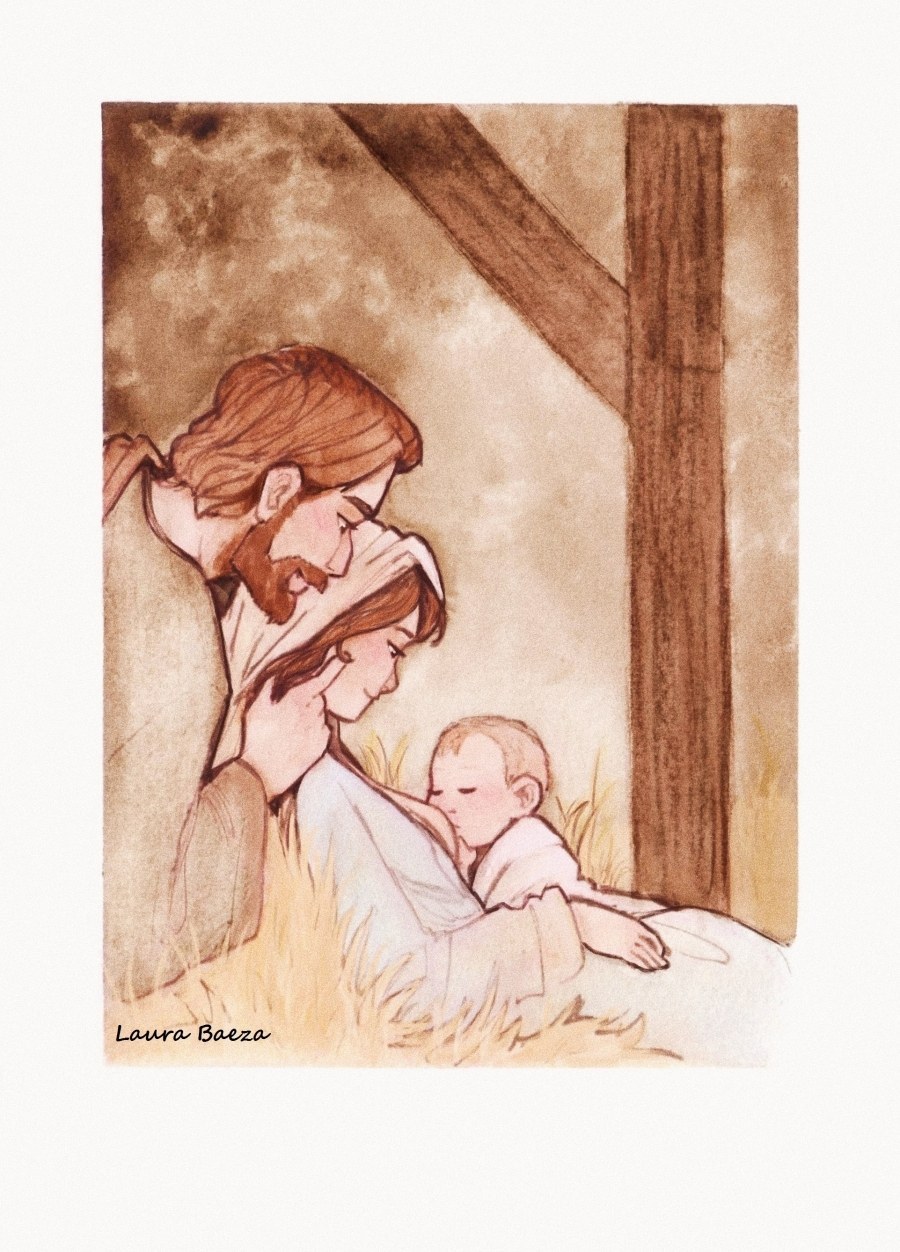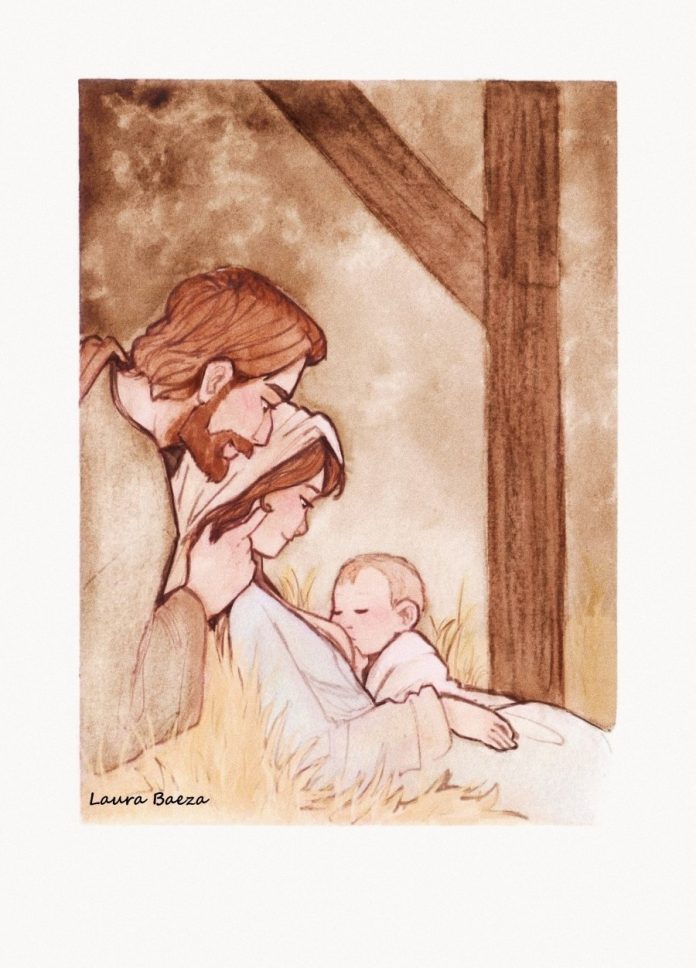
Por su interés, ofrecemos el artículo publicado hoy, víspera de Navidad, en www.larazon.es, que contempla cómo sería el parto de María, Madre de Dios: «O magnum mysterium, que de un conjunto de átomos que forma unas células que forman un órgano fonador dentro de unos cuerpos humanos brote algo tan intenso y sublime, infinitamente más que la suma de lo físico que lo sostiene, y a la vez imposible sin cuerpo». Ofrecemos el artículo también en su versión en inglés.
Un concierto de Navidad. Un coro iluminado en el auditorio oscuro, se abren las gargantas y empiezan a cantar.
O magnum mysterium,
et admirabile sacramentum,
ut animalia viderent Dominum natum,
jacentem in praesepio!
Beata Virgo, cujus viscera
meruerunt portare
Dominum Christum.
Alleluia.
Cierro los ojos y me dejo empapar, desbordar, por la música que llena el espacio. O magnum mysterium, que de un conjunto de átomos que forma unas células que forman un órgano fonador dentro de unos cuerpos humanos brote algo tan intenso y sublime, infinitamente más que la suma de lo físico que lo sostiene, y a la vez imposible sin cuerpo.
Y esto me remite al misterio del nacimiento de Jesús, algo tan intenso y sublime, infinitamente más que la suma de lo físico que lo sostiene, y a la vez imposible sin cuerpo.
Veo a María, Beata Virgo, cujus viscera meruerunt portare Dominum Christum, sudorosa, ojos cerrados, caminando con balanceo de parturienta, agarrando con fuerza el brazo de la esposa del cabrero, partera del pueblecito de Belén. En la noche, la respiración profunda de María y el susurro de las pezuñas de las cabras en la paja del suelo se entremezclan. Termina la contracción y María se detiene, escucha. Al otro lado de la puerta, en el corral, José recita con quietud y firmeza el salmo “…Bendice al Señor, alma mía: ¡Señor, Dios mío, qué grande eres! Estás vestido de esplendor y majestad y te envuelves con un manto de luz. Tú extendiste el cielo como un toldo y construiste tu mansión sobre las aguas. Las nubes te sirven de carruaje y avanzas en alas del viento…”.
Otra contracción, más paseo, más balanceo, respiración profunda. No hay miedo físico en esta hija de Israel que ha estado presente en los partos de sus primas, de sus vecinas, de sus amigas. No hay miedo espiritual en esta Virgen, pues virgen es quien se ha entregado por entero al Señor, cuerpo y alma, y confía. María siente con cada contracción como su hijo gira, desciende, se coloca, en ese baile ancestral, y sin embargo nuevo cada vez, del deslizamiento hacia la vida. Se sienta en el borde del pesebre y la matrona se arrodilla frente a ella, adoración a la madre que permanece con los ojos cerrados, en su ensueño de parto, a través del cual oye la voz de su esposo, “…Desde lo alto riegas las montañas, y la tierra se sacia con el fruto de tus obras».
Un gemido profundo, un pujo intenso y María abre repentinamente los ojos. Un bebé que se desliza desde su cuerpo a la sábana de lino que sostiene la partera. Un suspiro intenso de gozo al ver a su hijo, una sonrisa, una carcajada ¡o magnum mysterium! Al mundo le ha nacido un hombre nuevo, más grande que la suma de todas sus células, más grande que la suma de todos los hombres… y tan pequeño que María lo toma entre sus brazos, lo mira, lo huele, lo besa, se ríe de nuevo echando la cabeza atrás, ajena a la partera que corta el cordón.
Y fuera, la sonrisa en la voz de José, que canta “¡Aleluya! ¡Dad gracias al Señor, porque es bueno, porque es eterno su amor! ¡Dad gracias al Dios de los Dioses, porque es eterno su amor!”.
La partera sonríe y susurra también un salmo de agradecimiento, mientras ayuda a la Virgen a recostarse en una manta sobre la paja. María, absorta, ofrece el pecho al niño, que lo busca con concentración y lo encuentra con certeza. La succión vigorosa pronto hace que se libere la placenta, y durante un momento la joven despega los ojos de su hijo y alumbra el tejido que la partera recoge, asintiendo. Todo está bien. La mujer les cubre a ambos y sube por la escala de madera a la parte superior de la casita; va a coger la sal fina para rociar de forma ritual el cuerpo del recién nacido. Desde un hueco, sus propios hijos se asoman al misterio del nacimiento que ha ocurrido en su casa, bajo sus pies.
La puerta del establo se abre tímidamente y José asoma la cabeza. María alza la vista, sonríe, invita con los ojos llenos de infinito. José se acerca, venerando con la lentitud de cada paso, abrazando desde la distancia, amando con la compañía firme, ofreciendo en sus manos fuertes una humilde paternidad. Y María lo besa con la mirada. Ambos se vuelven hacia el hijo que ha nacido en Belén para el mundo entero. María ríe de alegría y el niño Jesús, recostado sobre ella, es mecido mientras toma el pecho.
O magnum mysterium. Feliz Navidad.
Carmela Baeza, médico de familia, IBCLC
———– ————- ————–
Body and Mystery
A Christmas concert. Brightly lit choir in a dark auditorium, throats open and song flows out:
O magnum mysterium,
et admirabile sacramentum,
ut animalia viderent Dominum natum,
jacentem in praesepio!
Beata Virgo, cujus viscera
meruerunt portare
Dominum Christum.
Alleluia.
I close my eyes and am immersed, soaked, surpassed by the music that fills all space. O magnum mysterium, o greatest of mysteries, that from atoms that form cells that form vocal chords inside a human person something so intense and sublime flows forth, infinitely more than the sum of its physical parts and yet impossible without them.
And this draws me toward the mystery of the birth of Jesus, so intense and sublime, infinitely more than the sum of its physical parts and yet impossible without them.
I envision Mary, Beata Virgo, sweat on her brow, eyes closed, walking in that swinging way of laboring women, holding tight to the goatherd´s wife, also village midwife, while they circle together around the dark stable. In the night, Mary´s labored breathing and the rustling of the goats´ hooves on the straw mingle into a gentle song. The contraction ends, Mary stops, listens intently. Beyond the door in the small patio, Joseph quietly and firmly recites the psalm: “Bless the Lord, my soul, O Lord my God, thou art very great; thou art clothed with honor and majesty. Who cores Himself with light as with a garment, who stretches out the heavens like a curtain? Who lays the beams of his chambers in the waters?’ Who makes the clouds his chariot and walks upon the wings of the wind?”
Another contraction, more walking, more swaying, deep breathing. There is no physical fear in this daughter of Israel who has witnessed the births of her cousins, her neighbors, her friends. There is no spiritual fear in ths Virgin, for virgin is she who has given herself wholly to the Lord, body and soul, and she trusts. Mary feels her child turn and descend with every contraction in that ancient dance of sliding toward life. She sits at the edge of the manger, and the midwife kneels before her, awed by this mother who has closed eyes, who is lost in the birthing stupor in which she dreamily hears her husband´s voice, “…from on high You water the hills, and the earth is filled with the fruit of your labor.”
A deep breath, a strong push, and Mary suddenly opens her eyes. A baby slides from her body unto the waiting linen on the midwife´s hands. A long joyful sigh when she sees her son, then a smile, than a laugh O magnum mysterium! Onto the world a new man has been born, greater than the sum of all his cells, greater than the sum of all the men… and yet so small that Mary takes him in her arms, she looks at him, smells him, kisses him, laughs again, throwing her head back with delight, not noticing when the midwife cuts the cord.
And outside, she hears the smile in Joseph´s voice as he sings “Aleluya! Give thanks to the Lord, for He is great, because His love is eternal!”
The midwife smiles and also whispers a psalm of thanks, while she helps the Virgin to lay upon a blanket on the straw. Mary, engrossed, offers her child the breast, and he searches for it and finds it with sure lips. The strong suckling frees the placenta, and for a moment the young mother looks away from her child as the midwife delivers the placenta, nodding. All is well. The woman covers them together and climbs up the ladder to her home, to gather the fine salt for the ritual sprinkling of the newborn. From a quiet corner, her own children lean out to gape at the mystery of birth that has happened in their home, under their feet.
The stable gate opens shyly and Joseph peeks in. Mary looks up, smile, invites with eyes that brim with infiniteness. Joseph nears, venerating with every slow step, hugging from a distance, loving with firm companionship, offering the humble paternity of his strong hands. And Mary kisses him with her gaze. They both turn toward the Son that has been born in Bethlehem for all the world. Mary laughs with joy, and the infant Jesus, laying on her breast, bounces gently while he feeds.
O magnum mysterium. Merry Christmas.
Carmela Baeza



